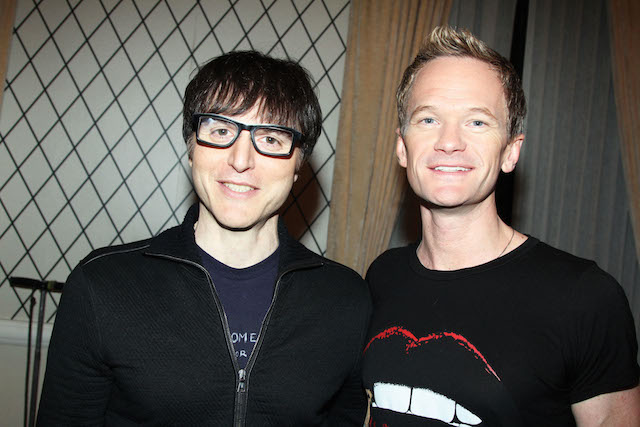Stephen Trask the Genius Behind Hedwig


Stephen Trask composed the music and lyrics for the Broadway hit musical, “Hedwig and the Angry Inch.” Before “Hedwig” was a massive hit on the great white way, it was a movie (that became a cult classic) which was in turn based upon the critically revered underground off-broadway hit that ran for two years at New York’s Jane Street theater. Stephen sat down with Ron Bennington to talk about Hedwig and her many incarnations.
Stephen talked about the different incarnations of “Hedwig”, and how different performers, and different venues can change the character and tone of the show.
Ron Bennington: To me, this album has always been able to stand on its own as a rock and roll album. It’s always interesting to see how many variations each new Hedwig brings to this.
Stephen Trask: Yeah people sing the song differently. John [Cameron Mitchell] had a very kind of Bowie-esque quality to him. And Neil [Patrick Harris] brings in– there were some times that I remember doing his vocals that they sounded just like Billy Joe from Green Day. But what really comes through for me with Neil doing it besides the fact that he sounds like a pretty good rock singer is that the character is so strong. So he’s selling these rock songs like a rock singer but I’ve had people ask– my sister asked me– did he have to put on the costume to feel the character so strong?
Ron Bennington: The venue changes the sound as well. You’re in a bigger venue here so you kind of go from a CBGBs feel into a theater feel. It’s almost like a Mott the Hoople thing that takes place.
Stephen Trask: It’s kind of a bigger event. We didn’t want to pretend we were someplace we weren’t.
Ron Bennington: I think David Byrne wrote this piece about- when you’re writing and performing music, the technology thats available to you at the time, and the speakers and music and the size of the room that you play, changes everything.
Stephen Trask: I read that article based on a book that he wrote and it’s true. Before there’s amplification you really have to write for the room, because if you’re in a tiny room, you can overpower and if you’re in a big room, you yourself have to be louder.
Trask talked about why the character of Hedwig is so relatable to people.
Ron Bennington: When you look at some of these lyrics, and the performance and the character of Hedwig, very few people should be able to identify with a German transexual. That’s a very specifc person. And yet its a very identifable piece.
Stephen Trask: Yeah, that’s something…..what you’re talking about was actually a discussion that we had very early on. We had to find ways of– I think the discussion actually started with the song Midnight Radio, and how many times i used the word rock and roll, and whether that was going to alienate people who didn’t listen to rock and roll. And it became a more general conversation about– if the character is really true to herself, and then expresses genuine human feelings and emotions, then people will identify because they see someone that’s different; then they see the real human emotions. They think to themselves, ‘oh I feel those same things even though the specifics of my life are very different’. And then all of a sudden you are identifying because you’re like ‘oh this person that seems to be very different from me, who in the last song had a failed vaginoplasty, which is not a common event, actually has a lot in common with me [because she] feels like an outsider and is living with repercussions of a series of bad decisions and choices and is trying to find her way out of that to some kind of self acceptance and happiness in life.
Ron Bennington: That song in particular, Midnight Radio, i would think that most of us could identify completely with being a kid, feeling alienated in some way, and a song comes on the radio that only you are hearing at the time but yet connects you to whatever is out there in the world. That song, could have been done by anybody. Bowie could close a show with that song, tomorrow. Or in 1973.
Stephen Trask: Wow thank you. Also you perfectly described exactly what I was going for when I was writing the song.
Trask talks about what Andrew Reynolds brings to Hedwig, that is different from what the prior “Hedwigs” brought to the piece.
Ron Bennington: You’ve got Neil Patrick Harris singing [on the Broadway recording], and now you have a new Hedwig on Broadway.
Stephen Trask: We’ve got a new Hedwig, Andrew Reynolds.
Ron Bennington: And how has he changed things?
 Stephen Trask: Well, the show is the same show and so Hedwig’s story is still the same story, but he has a different sense of humor. Cause its a role. The show is in the form of hedwig’s gig. And Hedwig is playing a gig next door to a big stadium performance, or in this case a performance in Times Square by a huge rock star who she claims to have a personal relationship with. And she’s trying to piggyback on his fame and tell her story and her emotions. And entertain a crowd who has only shown up because of some scandal she has with this guy. She’s trying to get her story out and carry all of this emotion inside. So she’s guarded but sometimes the emotion leaks out. And she’s funny and entertaining but sometimes gets a little bit mean to the band, and is almost always apologetic and realizes ‘oh oops I overstepped.’ So different actors will find a different combinations of guardedness or emotion; or emphasize one quality or another. Neil’s Hedwig had a very strong armor that takes a long time to break down. And Andrew’s Hedwig kind of shows her emotion more frequently, and earlier on, and kind of lets it get the better of her, sometimes. But then when you get to the end where Hedwig actually does tell the very emotional story of her and this rock singer, they’re very similar.
Stephen Trask: Well, the show is the same show and so Hedwig’s story is still the same story, but he has a different sense of humor. Cause its a role. The show is in the form of hedwig’s gig. And Hedwig is playing a gig next door to a big stadium performance, or in this case a performance in Times Square by a huge rock star who she claims to have a personal relationship with. And she’s trying to piggyback on his fame and tell her story and her emotions. And entertain a crowd who has only shown up because of some scandal she has with this guy. She’s trying to get her story out and carry all of this emotion inside. So she’s guarded but sometimes the emotion leaks out. And she’s funny and entertaining but sometimes gets a little bit mean to the band, and is almost always apologetic and realizes ‘oh oops I overstepped.’ So different actors will find a different combinations of guardedness or emotion; or emphasize one quality or another. Neil’s Hedwig had a very strong armor that takes a long time to break down. And Andrew’s Hedwig kind of shows her emotion more frequently, and earlier on, and kind of lets it get the better of her, sometimes. But then when you get to the end where Hedwig actually does tell the very emotional story of her and this rock singer, they’re very similar.
Ron Bennington: The Hedwig character too is so interesting because of the acting out. There’s a lot of places where she wouldn’t be the protagonist; somewhat abusive to the people around, and clearly driven by some unhealthy desires. It’s amazing. It’s really amazing that people embrace that character.
Stephen Trask: It is amazing. It’s a character, who as part of her show has these outbursts and then– there’s a number of times in the show where Hedwig says, “I’m sorry ladies and gentlemen”. or “I’m sorry you had to see that”. It happens repeatedly through the show. Andrews performance is really quite gorgeous. I don’t know if people know who Andrew is, but he was the star of the original Book of Mormon and he’s on Girls.
Stephen talks about Yoko performing a song for the “Hedwig” Tribute Album
Ron Bennington: Hedwig is out there in so many forms now. The original off-broadway version, which sounds a little different from the movie, and now Broadway. I think that’s another thing that has to pay some kind of testament to the songs themselves. Oh, and I also saw the thing they did for the kids downtown where a lot of people came in and sang. [Wig in a Box, Songs From and Inspired by Hedwig and the Angry Inch] Where Yoko was singing on the album which is — insane.
 Stephen Trask: It was insane and she called me up, and I wasn’t able to be there and she called me up and said “Hi Stephen, this is Yoko.” And i was like — I just started weeping — and she said how thrilled she was to sing the songs, and the only other person besides her own songs, the only other person whose songs she’d ever sung were John Lennon, and that my writing reminded her of the Beatles. It was like, okay! I’m done! And …but there’s some really great covers on that. The spoon version of Tear Me Down is unbelievable. There’s really great covers on that.
Stephen Trask: It was insane and she called me up, and I wasn’t able to be there and she called me up and said “Hi Stephen, this is Yoko.” And i was like — I just started weeping — and she said how thrilled she was to sing the songs, and the only other person besides her own songs, the only other person whose songs she’d ever sung were John Lennon, and that my writing reminded her of the Beatles. It was like, okay! I’m done! And …but there’s some really great covers on that. The spoon version of Tear Me Down is unbelievable. There’s really great covers on that.
Trask talks about writing “Origin of Love”, likening it to a children’s book.
Ron Bennington: This is one of those albums where my favorite song changes on it, but there are so many songs like– I think that Origin of Love could go out and be some kind of weird children’s film at some point. You could base an entire film on that alone.
 Stephen Trask: Thank you. You know, it started– the whole concept of it was a children’s book, and then that was worked into the monologue. But when I first wrote it, and I was really having trouble coming up with ‘the world’ in which these four legged two faced humans lived, and then all of a sudden it occured to me. These were the sorts of characters you’d find in a Dr. Seuss story. And i started picturing this book I had, Happy Birthday to You which is a Dr. Seuss book and I thought “oooh I can write it in a Dr. Seuss verse” so you just start picturing all the things and I’m describing them. So it’s [mime’s reading children’s book\ “When the earth was till flat…. And clouds made of fire…And mountains stretched up to the sky. Turn page. Sometimes higher.” And you know, it was like ‘yeah wow” and the whole thing kind of unfolds as a children’s story.
Stephen Trask: Thank you. You know, it started– the whole concept of it was a children’s book, and then that was worked into the monologue. But when I first wrote it, and I was really having trouble coming up with ‘the world’ in which these four legged two faced humans lived, and then all of a sudden it occured to me. These were the sorts of characters you’d find in a Dr. Seuss story. And i started picturing this book I had, Happy Birthday to You which is a Dr. Seuss book and I thought “oooh I can write it in a Dr. Seuss verse” so you just start picturing all the things and I’m describing them. So it’s [mime’s reading children’s book\ “When the earth was till flat…. And clouds made of fire…And mountains stretched up to the sky. Turn page. Sometimes higher.” And you know, it was like ‘yeah wow” and the whole thing kind of unfolds as a children’s story.
Trask talks about process of writing music that is also a story, and how he wrote “Wig in a Box”
Ron Bennington: I’ve talked to so many songwriters who just say, ‘you know, the songs show u p when they show up. I’m not sure the song is there..I’m there everyday and every once in awhile the song shows up and if i’m lucky enough it’s a hit.’ But how do you do that when you’re creating specifically to tell a story– a long piece like this?
And so when I wrote Wig in a Box, John had said to me, “write a song to the wig.”
And I was like, ‘how am I going to do that?’ I didn’t know what this was. Do I write an emotional song to the wig? I didn’t know. And then one night, it was Saturday night and for some reason I was home and my roommate had been stealing booze from work and so there were some bottles, and I just starting drinking and I started pounding out these chords at the piano and singing this wordless thing and having so much fun doing it. I’m like laughing and singing loudly and banging on the piano. And I was probably doing it for about 10 or 15 minutes, maybe longer I have no idea, and I thought, “Oh! Wig Song!’ Because the wig song has to feel like this. It has to make the audience feel just like what I’m feeling right now. And so …but I wasn’t setting out to write the wig song, I just knew I had to write a wig song, and I recognized it when I was playing it.
Trask talks about why this show works, in ways that other rock shows did not work.
Ron Bennington: To me, if it didn’t work on the rock and roll level everything else is going to fall apart. It could be as funny as you want, it could be as touching as you want but if the songs weren’t there….the whole rock n roll musical thing has been tried or attempted to be adapted. I don’t think that the Tommy thing on broadway ever captured what The Who was ever about. I dont know if the Green Day thing worked either. But there’s something about this piece that you have that its probably the best rock and roll musical ever, and a lot of great people have tried it.
Stephen Trask: I’m going to answer just that last bit. I think part of what I had going for me in this was that I was extremely sure of myself. I was a genuine rock musician working up in clubs who got challenged to do this thing but I also wasn’t like a hit musician. i wasn’t Sting coming up with a show. Sting had a whole history and Paul Simon had a whole history. Its very hard if you’re a director or a book writer or a producer to say to Pete Townshend, ‘no, I know better.’ So I think one of the things that I lucked out with was that I came in knowing that there was just a whole bunch of stuff I didn’t know. I also didn’t have that kind of personality or success that would make me able to just pretend that I knew, and get my opinion heard. Now, I don’t know if thats what went wrong with say… Cape Man which had great music but…
Ron Bennington: Unbelievable music and I went to see them when they brought it back at BAM. and i was like, this should have been a hit. I went to see Randy Newman’s thing where he bought it back not too long ago, when they went out and did the entire Faust piece. And this should have been a giant hit but for some reason it couldn’t all be put together.
Stephen Trask: When you’re doing theater, and I know this from opening night gifts — the authors give gifts to everybody — and I had a list of 104 people I gave gifts to. There’s a lot of people involved and you have to take into account a lot of opinions and a lot of opinions that are very well informed, and a lot of people might have extremely good interpretations that might be different than your own. You have all of these departments that all have to work together. So the choreography department, the costume department and the sound department and the music department all have to work together with the director’s vision and the songwriter’s vision and one thing that can happen is that everybody gives up a little bit to make the intersection work as opposed to — and i think this was our approach when we got to those spots where it wasn’t working from a rock perspective or it wasn’t working from a theatrical perspective, we looked for the hard answer. We never settled for– well I can sacrifice this and you don’t get that and now this moment works. It doesn’t really work– it just doesn’t not work. We just kept looking for the harder answer and weren’t happy — we never compromised. We just found the thing that made us all happy.
You can hear Ron Bennington Interviews exclusively on SiriusXM satellite radio.
